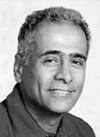Professor AbuBakr S. Bahaj
Professor AbuBakr S Bahaj, FICE, FRSA, MInstP, CPhys is head of the Energy & Climate Change Division (ECCD) at the University of Southampton where he completed his PhD in 1982, and progressed from a researcher to a Personal Chair of Sustainable Energy.
For more than 25 years, Prof Bahaj has pioneered sustainable energy research as the head of one of the UK’s leading university-based research groups, the Sustainable Energy Research Group, (SERG). The aims of ECCD and SERG are to promote and conduct fundamental and applied research and pre-industrial development in the areas of energy technologies, improvements in energy efficiency and assessing the impact of climate change on the built environment. Under the leadership of Prof Bahaj, the SERG involvement in ground breaking research projects in the UK, as well as in China, the Middle East and Africa, has been pivotal. Prof Bahaj is a major contributor to the energy debate at local, national and EU levels as well as through the organisation of and participation at major international conferences and meetings.
As an experienced research team leader, Prof Bahaj has initiated and managed research in ocean energy conversion (resources, technologies and impacts), photovoltaics, energy in buildings and impacts of climate change on the built environment, resulting in over 240 published academic articles in journals and conferences of international standing (see Google Scholar publication analysis). From 2001 to 2007, Prof Bahaj was a member of the Department of Business and Regulatory Reform (BERR) Technology Programmes Panels on Water (including ocean energy) and Solar Energy. He is the co-ordinator of the UK’s Engineering and Physical Sciences Research Council (EPSRC) Eco-region research networks that aim to develop research themes and projects to study eco-city development encompassing resource assessment, technology pathways for the production and conservation of energy, planning, and the social and economic studies required in establishing eco-regions in China and elsewhere (www.eco-networks.org) (2007 – 2011). He is also an appointee of the EPSRC, the Tyndall Centre for Climate Change Research Supervisory Board (2005 to 2010) and is a member of the British Standards Institute (BSI) Committee on Standards for PV Energy Systems (GEL82) representing the UK on the International Electrotechnical Commission (IEC) – Working Group 2 (WG2: PV systems) (2004 – to date).
An internationally recognised expert in the field of renewable energy, Prof Bahaj has been invited to deliver keynote addresses at conferences throughout Europe, America, Middle East and the Far East. In 2007, he was invited to give the RSA Sigma President’s Lecture, chaired by HRH Prince Phillip. Prof Bahaj organised, managed and chaired the 9th European Wave and Tidal Energy Conference (EWTEC11), held in Southampton which was attended by around 500 participants from 22 countries. For over two years, he has chaired the EWTEC technical committee which runs the most prestigious global academic event in ocean energy research and development and he also chaired the Technical Committees of the World Renewable Energy Congress (WREC), held in Glasgow 2008. He is an active member of the technical committees of other conferences such as the Asian Wave and Tidal Energy Conference (AWTEC), the 27th International Conference on Offshore Mechanics and Arctic Engineering (OMAE 2008, Estoril), and a member of the Management and Technical Committees of the European Wave and Tidal Energy Conferences (EWTEC, Porto 2007, Portugal, Uppsala 2009, Sweden).
Recently, Prof Bahaj established a new journal International Journal of Marine Energy, Elsevier, that addresses the research areas of ocean energy, focussing on wave and tidal energy. He was also the Guest Editor to the following issues: (a) ‘New Research in Tidal Current Energy’, UK’s Royal Society Philosophical Transactions A; January 2013 and ‘Marine Energy’ Renewable Energy, Volume 31, Issue 2, February 2006. He is also is an Associate Editor of the Journal Renewable & Sustainable Energy Reviews and is on the Editorial Boards of the journal Sustainable Cities and Society and the International Journal Sustainable Built Environment. Previously, he was on the Editorial Boards of the journal, Renewable Energy (2005 – 2011) and the UK’s Institution of Civil Engineering journal Energy (2006-2009). Prof Bahaj was also the Volume Editor and contributor for ‘Ocean Energy’ volume in a newly published major reference work, entitled Comprehensive Renewable Energy, Elsevier, (May 2012). This is an 8-volume work representing the latest research and development in renewable energy. In Feb 2013, this publication was awarded the PROSE Award 2012, Reference Work: Best Multivolume Reference/Science, by the American Association of Publishers.
To address education and training in the areas of energy and climate change Prof Bahaj developed two revolutionary MSc programmes – MSc Energy Resources & Climate Change and MSc Energy Environment & Buildings, covering energy generation, energy resources and climate change and energy in the built environment (www.energymasters.soton.ac.uk).
Prof Bahaj also acts as a panel member and reviewer for major research and grant awarding bodies including: EPSRC, the Canada Foundation for Innovation, the Ireland Higher Education Authority, Science Foundation Ireland, Technology Strategy Board (TSB) the Commonwealth Scholarship Commission, the U.S. Dept. of Agriculture Small Business Innovation Research (SBIR), New Zealand Foundation for Research Science and Technology. Appeared as an expert witnesses before the House of Lords’ Select Committee, contributed to UK Government Chief Scientific Advisor Technology and Innovation Futures Project as well as the International Energy Agency (IEA) work on marine energy.
In 2012, Prof Bahaj was appointed Chief Scientific Advisor to Southampton City Council—believed to be the first such appointment in the UK and in 2014, the UK’s Science Council named him as one of the UK’s 100 leading practising scientists.
